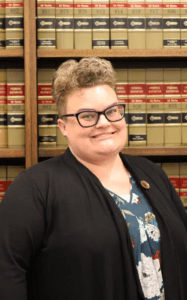
Dean's Book Review – Three Generations, No Imbeciles
DATE: Wednesday, October 27 2021
TIME: 8:00 am - 9:00 am
LOCATION: Virtual Event
TALK DESCRIPTION:
Please join Dean Elizabeth Kronk Warner for her monthly dean’s book review. The book to be reviewed will be, Three Generations, No Imbeciles: Eugenics, the Supreme Court, and Buck v. Bell by Paul A. Lombardo. This book was selected in celebration of October being National Disabilities Awareness month.
“Three generations of imbeciles are enough.” Few lines from Supreme Court opinions are as memorable as this declaration by Justice Oliver Wendell Holmes Jr. in the landmark 1927 case Buck v. Bell. The ruling allowed states to forcibly sterilize residents in order to prevent “feebleminded and socially inadequate” people from having children. It is the only time the Supreme Court endorsed surgery as a tool of government policy. Paul Lombardo’s startling narrative exposes the Buck case’s fraudulent roots.
In 1924 Carrie Buck—involuntarily institutionalized by the State of Virginia after she was raped and impregnated—challenged the state’s plan to sterilize her. Having already judged her mother and daughter mentally deficient, Virginia wanted to make Buck the first person sterilized under a new law designed to prevent hereditarily “defective” people from reproducing. Lombardo’s more than twenty-five years of research and his own interview with Buck before she died demonstrate conclusively that she was destined to lose the case before it had even begun. Neither Carrie Buck nor her mother and daughter were the “imbeciles” condemned in the Holmes opinion. Her lawyer—a founder of the institution where she was held—never challenged Virginia’s arguments and called no witnesses on Buck’s behalf. And judges who heard her case, from state courts up to the U.S. Supreme Court, sympathized with the eugenics movement. Virginia had Carrie Buck sterilized shortly after the 1927 decision.
Though Buck set the stage for more than sixty thousand involuntary sterilizations in the United States and was cited at the Nuremberg trials in defense of Nazi sterilization experiments, it has never been overturned. Three Generations, No Imbeciles tracks the notorious case through its history, revealing that it remains a potent symbol of government control of reproduction and a troubling precedent for the human genome era.
If you have any questions please email, robbi.richter@law.utah.edu
PANELISTS:
 Dianna Cannon (’92) is the managing partner at Cannon Disability Law, P.C., where she specializes in Social Security Disability law. She also represents clients seeking Black Lung Disability benefits and Railroad Retirement Disability benefits. Additionally, she is accredited by the Veteran’s Administration and represents Veterans seeking service-connected disability benefits. Ms. Cannon is an Adjunct Professor of law at the University of Utah S.J. Quinney College of Law where she teaches Disability Law and serves on the Board of Trustees. Her book, Social Security Disability Claims, Volumes 1 & 2, is updated yearly and published by Thomson Reuters. She is a sustaining member of the National Organization of Social Security Claimant’s Representatives and a member of the Utah, Nevada, and California State Bar Associations. She served as president of the Women Lawyers of Utah and as a Contributing Editor to the Utah Trial Journal. She received her J.D. from the University of Utah College of law in 1992, where she was a Note and Comment Editor for the Journal of Contemporary Law.
Dianna Cannon (’92) is the managing partner at Cannon Disability Law, P.C., where she specializes in Social Security Disability law. She also represents clients seeking Black Lung Disability benefits and Railroad Retirement Disability benefits. Additionally, she is accredited by the Veteran’s Administration and represents Veterans seeking service-connected disability benefits. Ms. Cannon is an Adjunct Professor of law at the University of Utah S.J. Quinney College of Law where she teaches Disability Law and serves on the Board of Trustees. Her book, Social Security Disability Claims, Volumes 1 & 2, is updated yearly and published by Thomson Reuters. She is a sustaining member of the National Organization of Social Security Claimant’s Representatives and a member of the Utah, Nevada, and California State Bar Associations. She served as president of the Women Lawyers of Utah and as a Contributing Editor to the Utah Trial Journal. She received her J.D. from the University of Utah College of law in 1992, where she was a Note and Comment Editor for the Journal of Contemporary Law.
Natasha Carlton, Associate Director Student Activities/Advising, University of Utah S.J. Quinney College of Law
 Beth Jennings, Assistant Librarian, University of Utah S.J. Quinney College of Law James E. Faust Law Library
Beth Jennings, Assistant Librarian, University of Utah S.J. Quinney College of Law James E. Faust Law Library
My scholarship addresses the way that queer identities impact legal information needs, information-seeking behavior and legal representation. Critical to this is a focus on library service and information accessibility for queer library users and the legal tools and “work-arounds” employed by LGBT family law practitioners.
